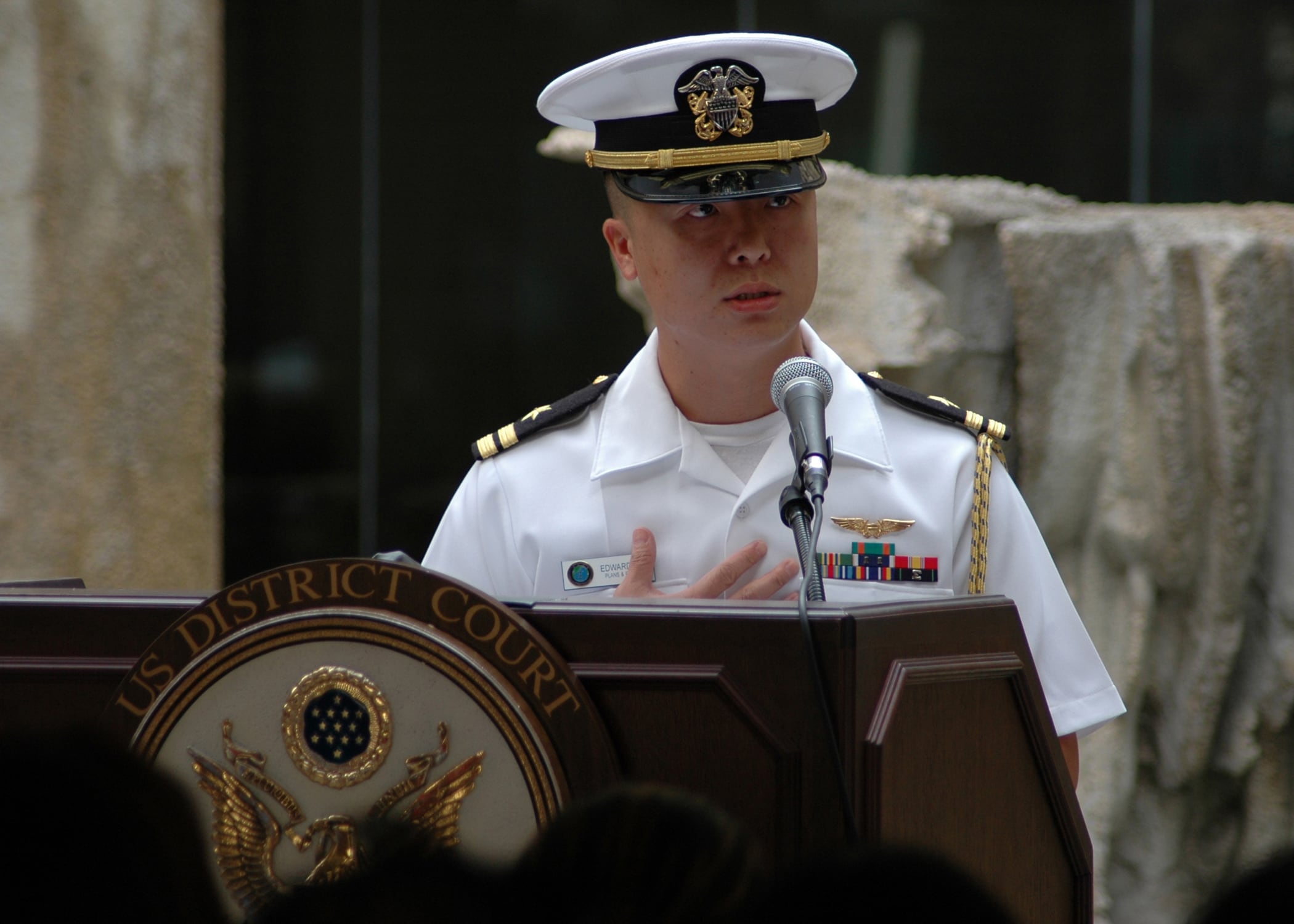This article was originally published at 5:32 p.m. on April 11 and has been updated.
A Taiwan-born U.S. Navy officer charged with spying for a foreign power worked at one of the service's most elite reconnaissance squadrons, whose operations are shrouded in secrecy. and secretive maritime surveillance sqadunits in the Navy, according to his bio released to Navy Times.
Lt. Cmdr. Edward Lin, a naval flight officer, worked for Special Projects Patrol Squadron 2 out of Kaneohe, Hawaii, for a year before being arrested last summer, according to his Navy record. The Kaneohe, Hawaii-based VPU-2 is one of two special projects squadrons that sources say are made up of the fleet's top maritime patrol officers, who fly the P-3 Orion and P-8A Poseidon.
"VPU guys are generally the top 25 percent of the program," said an aviation officer who asked for anonymity to discuss sensitive familiar with P-3 and maritime surveillance programs. "They are specially screened."
Lin faces charges for sharing classified information with sources in the Asia-Pacific region. His placement inside the shadowy world of VPU-2 could give foreign spymasters unparalleled access into classified reconnaissance capabilities and intelligence from the region. placing an accused spy inside a command whose operations are top secretofficers in the fleet.
Very little is public about the VPUs, including details about the aircraft they fly. The outfit has access to Joint Urgent Operational Needs funds, which sidestepscircumvents and speeds up the normal acquisitions process, the officer said.
Generally speaking, the VPU officers are those who earned the highest evaluations during their first tour, the officer said.
"In the P-3 community they are known as ‘Jerry’s Kids’ because they are special," the officer said, referring to the charity run by comedian Jerry Lewis that aided children aimed at kids with special needs. "Basically what that means is that whatever the special projects guys need, they get."
The squadrons are set aside for "national-level tasking," the officer said, which could mean any number of things but the details of their missions are highly classified.
Two sources familiar with the squadrons said These squadrons fly specially outfitted maritime patrol airplanes designed to collect signals and electronic intelligence, among other types of surveillance amid and gathering, among a number of other things including intelligence, surveillance and reconnaissance flights.
"They have the coolest stuff, as much of it as they need and what they do with it is classified," the officer said.
The squadrons have been known to fly planes with high-tech electronic surveillance gear designed to look like standard maritime patrol and anti-submarine warfare aircraft, according to a website dedicated to P-3 Orions and their missions.
Who is Edward Lin?
Lin went before an Article 32 preliminary hearing FridayApril 8 on multiple charges of espionage, attempted espionage and communicating defense information charges, according to his Navy charge sheet released to Navy Times.
Investigators believe Lin was spying for either Taiwan or the People’s Republic of China, or both, according to multiple defense and U.S. officials who asked for anonymity to discuss an ongoing legal case.spoke to Navy Times on background.
Lin enlisted in the Navy in 1999 and was in the nuclear power training pipeline until he was picked up for officer candidate school in 2002, according to his bio.

An attorney for Lt. Cmdr. Edward Lin says his client is innocent of espionage charges. Lin, a native of Taiwan, spoke at his naturalization ceremony in 2008.
Photo Credit: MC1 Sarah Murphy/Navy
He was commissioned in May of that year and went on to flight training and then NFO school. Over the next 11 years he joined a handful of squadrons around the country, did a sea tour on the carrier Dwight D. Eisenhower and a shore tour at the Navy's comptroller's office at the Pentagon.
Lin moved to the U.S. when he was 14 from Taiwan, and became a naturalized U.S. citizen in 1998. He spoke at a 2008 naturalization ceremony, where he said he grew up dreaming of coming to America.
"I always dreamt about coming to America, the 'promised land,'" he said, according to a Navy release from the 2008 event. "I grew up believing that all the roads in America lead to Disneyland."
He joined the special projects unit in the spring of 2014, according to his bio.
The judge has 10 days from the Article 32 hearing to recommend whether the case should be referred to court-martial.
Correction: A previous version of this article erroneously stated the year Lin became a U.S. citizen. It was 1998.
David B. Larter was the naval warfare reporter for Defense News.




